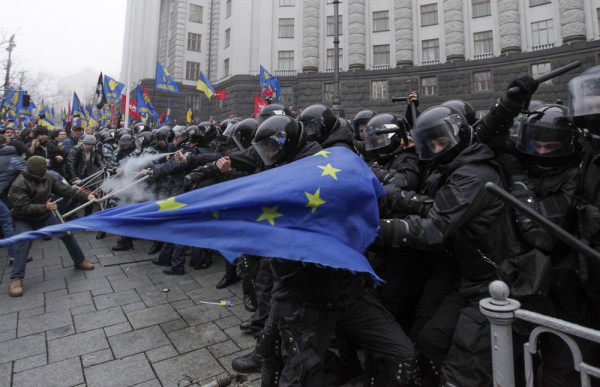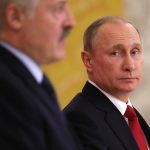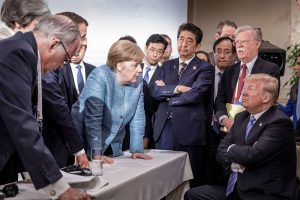by Derek Davison
If you’re looking for a one sentence indicator about the state of post-Euromaidan Ukrainian politics, consider this: the man who is expected to win next month’s presidential election (assuming it actually takes place) is a billionaire chocolatier named Petro Poroshenko, who served as foreign minister under former Ukrainian President Viktor Yushchenko, and then as minister of trade and economic development for a government allied with Yushchenko’s rival and successor, Viktor Yanukovych, before becoming one of the leaders of the protest movement that forced Yanukovych from office in February.
Ukraine’s national politics since Leonid Kuchma’s presidency (1994-2005) have been dominated by the rivalry between two men: Yushckenko, who served as Kuchma’s prime minister from 1998-2001 before going into opposition, and then as Ukraine’s president from 2005-2010, and Yanukovych, who twice served as prime minister (under Kuchma from 2002-05 and then under Yushchenko from 2006-07) before being elected as president in 2010 and serving until Euromaidan removed him. Yushchenko was aligned with a broadly pro-EU, anti-Russia faction, while Yanukovych had closer ties to Moscow.
Both men are now out of Ukrainian politics. Yanukovych has the distinction of having twice been removed from the Ukrainian presidency by popular uprising. He was declared the winner of the 2004 presidential election, but allegations of fraud inspired the Orange Revolution, led by Yushchenko and Yulia Tymoshenko. The uprising forced a re-vote, which Yushchenko won. Yushchenko went on to suffer perhaps the worst electoral defeat for an incumbent president in modern history in 2010; he barely cleared 5% of the vote and was kept out of the run-off, in which Yanukovych defeated Tymoshenko. The third figure in this dysfunctional triumvirate, Tymoshenko, voted in 2009 with Yanukovych’s party to strip her erstwhile ally Yushchenko of his presidential powers, and then joined Yanukovych’s pro-Russian faction. After Yanukovych became president, he tried and convicted Tymoshenko (with the aid of Yushchenko’s testimony) on corruption charges in 2011. Since her release from prison, Tymoshenko seems to have appointed herself as one of the leaders of the anti-Russian (and anti-Yanukovych) movement.
In other words, if it’s consistency you’re after, Ukrainian politics probably aren’t for you. Frequent shifts in personal loyalty and party ideology, the ongoing tug of war between pro-European and pro-Russian factions, and high turnover in government (no fewer than eight different cabinets have been formed since Yanukovych’s first stint as prime minister began in 2002), have kept Ukraine from enjoying any semblance of political stability.
With Yanukovych and his Russian sympathies out of favor, the new divide in Ukrainian politics seems to be between neoliberalism and hard-right nationalism or even neo-fascism. A significant proportion of the Euromaidan movement consists of far-right Ukrainian nationalists led by the Svoboda Party, which has been given important posts in the interim Ukrainian cabinet. More troubling still is the degree to which the protests were escalated by neo-Nazi militias like “Right Sector.” It bears repeating that the first law passed by the Ukrainian parliament after Yanukovych was removed from office was an ultra-nationalistic repeal (which was not signed into law by interim President Oleksandr Turchynov) of a 2012 law giving semi-official status to languages deemed regionally important. For reasons that should be obvious by now, the presence of these far-right elements in the government only serves to divide Ukrainians and ethnic Russians in the east from the government in Kiev.
The rest of the Euromaidan leadership is largely neoliberal. The common thread binding Ukraine’s neoliberals is Kuchma. His administration implemented a number of neoliberal economic “reforms,” including rapid privatization and austerity measures intended to balance Ukraine’s budget. This was done in close cooperation with the International Monetary Fund (IMF), in order to secure billions in IMF loans and to prepare Ukraine for membership in the EU. Coming at the height of the economic crisis that followed the collapse of the Soviet Union, these “reforms” closely resembled the kind of radical “disaster capitalism” that will be familiar to readers of Naomi Klein’s book, The Shock Doctrine.
Yushchenko followed much the same set of neoliberal policies when he was elected president, and while his administration did preside over a growing Ukrainian economy, it also left Ukraine especially vulnerable to the 2008 global economic crisis, which wiped out most of the gains that had been made in previous years and led to Yushchenko’s historic defeat in 2010. Yanukovych, struggling to maintain closer ties to Moscow without abandoning the neoliberal IMF/EU agenda, failed to repair the damage, and the pro-EU Euromaidan movement began in response to the continued economic struggles.
While it’s too soon to speculate what Poroshenko’s economic policy would be, his past as a close Yushchenko ally hints at his neoliberal sympathies. The current interim government is dominated by figures from Tymoshenko’s Batkivshchyna Party, including Prime Minister Arseniy Yatsenyuk, a favorite of Victoria Nuland, the US Assistant Secretary of State for European and Eurasian Affairs, who has ties to prominent neoconservatives. Nuland favors the kind of shock capitalism that is practiced by the IMF and that guided the economic policy of the Kuchma and Yushchenko administrations. Yatsenyuk has referred to the cabinet he heads as a “kamikaze” government because of the “extremely unpopular” financial policies it plans to implement, and has promised to follow IMF-dictated austerity measures. Considering the impact of these policies on Greece, it’s remarkable that Yatsenyuk has embraced them so whole-heartedly and unquestioningly.
Ukraine faces immense challenges. The threat of pro-Russian separatism in the east is the most immediate concern, closely followed by the related risk of hostile Russian action, be it military in nature, economic (e.g., shutting off natural gas exports), or both. But the economic crisis that brought down Yushchenko and helped to bring down Yanukovych has not been abated, and it will be impossible to stabilize potential breakaway regions if the Ukrainian economy continues to struggle. Ukraine desperately needs competent, stable governance right now, but based on its recent political history and on the choices it now faces between destructive ultra-nationalism and failed neoliberalism, there’s little reason for optimism on this front.
Photo: Demonstrators march and carry an EU flag during a protest in Kyiv, Ukraine, Nov. 24, 2013.






As long as there are Neoliberal forces running the U.S.State Department, then there will be chaos in every country they touch. Perhaps in the beginning, their intentions were good [?], but like a pack of dogs that taste blood, then they will only continue in their drive to wreck havoc upon those countries. They are doing more to destroy the U.S. then any foreign terrorist group could ever dream of doing.
How this turmoil is being exploited to sabotage Putin’s cooperation with Obama in the Middle East is described in “Why Neocons Seek to Destabilize Russia” by Robert Parry.